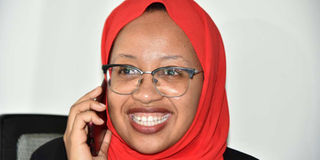UN body asks Kenya to look beyond the one-third gender threshold

The United Nations agency for gender equality and women empowerment, UN-Women has commended the Kenyan government for increasing the number of women in leadership positions.
In the latest Cabinet reshuffle done by President Uhuru Kenyatta recently, the number of women Cabinet secretaries increased from six to seven out of the total 21 positions.
“This progress, albeit very modest, is of benefit to the government and its people and we hope to see further and more robust inclusion of women into the country’s cabinet, as well as all other elective and appointive bodies of government,” UN-Women says in the statement.
The agency, however, observed that in the recent appointments, the percentage of women at the Principal and Chief Administrative Secretaries level are still below the 30 per cent constitutional threshold, standing at 18 and 24 per cent respectively.
“There is still space to improve and we must look beyond the one third threshold and set our sights on an equally representative government. Such an achievement will embody one of the Sustainable Development Goals (SDGs) and targets for 2030, which seeks to ensure women’s full and effective participation and equal opportunities for leadership at all levels of decision-making in political life,” the statement says in part.
The agency indicated that global experience proves that women’s strong representation in politics translates into a wide spectrum of societal benefits, including greater investment in education, a more gender balanced workforce, with favorable impact on Growth Domestic Product (GDP) growth.
Under the new Constitution 2010, the government has an obligation to ensure there is increased gender parity in political leadership in the country.
Lasting gender equality
Article 27 (8) of Kenya’s Constitution provides that “the State shall take legislative and other measures to implement the principle that not more than two thirds of the members of elective or appointive bodies shall be of the same gender."
The UN agency said it is committed to deliver and prioritise on gender equality and women empowerment.
Among the priorities the agency is focusing on is equal representation of women in decision-making as a fundamental factor in attaining and securing sustainable and lasting gender equality.
The agency promised to continue supporting the national and county governments, and civil society organisations in order to achieve these goals.
In the fresh changes, Uhuru appointed Betty Maina as Industrialisation CS and 15 new chief administrative secretaries, eight of whom are women.
The nomination of Maina brought the number of women in the Cabinet to seven. They are Amina Mohamed (Sports, Culture and Heritage), Margaret Kobia (Public Service and Gender) and Farida Karoney (Lands and Physical Planning).
Others who were appointed included Raychelle Omamo (Foreign Affairs), Sicily Kariuki (Water) and Monica Juma (Defence).
Among the Chief Administrative Secretaries include Rachael Shebesh (Public Service and Gender), Maureen Magoma (information and communication) and Winnie Guchu (State law office).
Others include Wavinya Ndeti (Transport) Lina Jebii Kilimo (Agriculture, Livestock and Fisheries), Ann Martha Mukami (Agriculture), Mercy Mukui (Health), Mumina Bonaya (Education) and Nadia Ahmed Abdalla (ICT, Innovation and Youth).
Pundits says seven women in a 21-member Cabinet (excluding the President, Deputy President and Attorney General) is still far away in gender equality efforts compared to other countries in the region among them Rwanda and Ethiopia.





